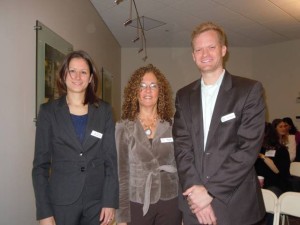The Westchester Green Business Challenge, a partnership that helps businesses move toward a path of environmental sustainability, plans to create a green business certification program.
The pilot program, which launches Jan. 28, invites all businesses to network with other green-minded companies, take advantage of its resources and guidelines that help companies achieve a higher level of environmental sustainability and attend webinars and training sessions.
“There are companies out there that are already incorporating environmental sustainability and corporate social responsibility into their core business,” said Dani Glaser, one of the creators and administrators of the WGBC. “This certification is another way for them to be business leaders in the county and within their industry. They”™re also saving money and helping the environment.”
The Westchester Green Business Challenge, created in 2009, is a partnership with the county government and The Business Council of Westchester.

Thirteen companies have enrolled in the business challenge program and about 50 companies attended the nonprofit”™s green business certification preview event in December.
Some companies are participating in the certification program because they want to set an example as green pioneers in their industry, Glaser said.
Briarcliff Manor-based Thalle Industries Inc., a supplier of virgin and recycled aggregate, asphalt products and brownfield fill for the construction industry, joined the pilot program with the intent of increasing its visibility as a leader in green business practices.
The company has been reusing its asphalt material and has its own recycling center in Elmsford. Although Thalle feels its efforts to go green have gone unnoticed, the company hopes its certification will spark conversations in other asphalt production companies about ways to be more environmentally conscious.
Glenn Pacchiana, CEO and president of Thalle, said he is aware of the increasingly rigorous environmental standards the state is setting on commercial industries that pollute. He said he wants to keep his company ahead of the curve, especially at a time when companies run the risk of being shut down for violating environmental codes.
“We now burn waste oil to heat our plants,” Pacchiana said about the company”™s asphalt plant and quarry in Fishkill. “We also have large equipment loaders, excavators, trucks and crushing equipment. They all burn a lot of fuel, so we try to get the most fuel-efficient equipment out there. It pays to buy new equipment instead of hanging onto the old stuff that”™s polluting the air.”
Lisa Moir, who opened The Blue Pig Ice Cream in 2010, was passionate about sustainability from the very beginning. She threw out the Styrofoam cups and plastic spoons and instead brought out paper cups and compostable spoons made of corn fiber. Not only does she serve her products with eco-friendly tools, but the ice cream store in Croton-on-Hudson makes homegrown products from the store”™s rooftop garden and local farms.
The maple syrup topping comes from White Oak Farm in Yorktown Heights, the honey from Croton beekeepers, the eggs from chickens on Moir”™s own farm, and the milk from Hudson Valley Fresh, a local dairy co-op in Dutchess County.
With the green business certification, Moir plans to take her business to the next level. She has already reduced her electricity bill by turning off the air conditioning in the summer and using a drip irrigation system to conserve water. But she wants to do more.
“We”™re looking into using alternative energy sources like solar,” she said.
Other companies are looking into similar practices. Dennis Noskin, principal of Dennis Noskin Architects L.L.C. in Tarrytown, is participating in the green business certification pilot program with plans to install solar panels on the roof of his company”™s building at 100 White Plains Road.
“We”™re lucky our building has a 600-square-foot flat roof,” Noskin said. “We”™re working with Dani to install photovoltaic solar panels that feed into our electricity and diminish the cost on our electric bills. It”™s a long-term goal we hope to get done in 2014.”




















